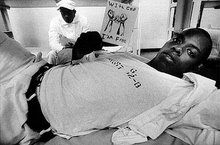 "So you don't take your kids to the doctor when they get a fever and they never take antibiotics - which I find hard to believe given the prevalence of strep throat, bronchitis, and UTI and the mortality/morbidity associated with these diseases if untreated" - Submariner
"So you don't take your kids to the doctor when they get a fever and they never take antibiotics - which I find hard to believe given the prevalence of strep throat, bronchitis, and UTI and the mortality/morbidity associated with these diseases if untreated" - Submariner Researchers from the Southern California/RAND Evidence-based Practice Center (EPC) found some interesting findings, including:
Researchers from the Southern California/RAND Evidence-based Practice Center (EPC) found some interesting findings, including:• Nearly two-thirds of children with uncomplicated ear infections recover from pain and fever within 24 hours of diagnosis without antibiotic treatment
• Over 80% recover within 1 to 7 days.
• Approximately 93% of children treated with antibiotics recover within 1 to 7 days.
• Researchers also found that the newer and more costly antibiotics, such as cefaclor, cefixime, azithromycin, or clarithromycin, provided no additional benefit to children than amoxicillin.
• Amoxicillin caused fewer side effects than the other antibiotics as well.
• The EPC also found no evidence that short-duration (5 days or less) versus long-duration therapy (7-10 days) made a difference in the clinical outcome for children over 2 years of age.
More than 5 million cases of acute ear infections occur annually, costing about $3 billion.
















































































































10 comments:
Notice that I never mentioned otitis and the study cited doesn't include pharyngitis, UTI, and bronchosinusitis. Again revealing your penchant to speculate without examining things closely and confusing recreation with education.
Wasn't really about what you mentioned Sub.
It was about children recovering from illnesses without drugs.
I know that can seem strange. And it's not what Merck and Phizzer want to hear.
Wasn't really about what you mentioned Sub.
Then why use my words and conjoin it with the study cited. Most people recover from innumerable illnesses without medical intervention. The three bacterial illnesses that I specified above are examples where antibiotics are clearly indicated. It would be malpractice and unethical to diagnose these conditions in a baby or child and withhold antibiotics.
You are embarrassing yourself.
Now I have a question for the parents in the audience (Submariner is not allowed to answer).
What would you do in this situation:
You have a 4-week old infant, who for a couple of weeks had been feeding OK, but now you notice
Projectile vomiting. (Forceful ejection of milk or formula up to several feet away) within a half hour after each feeding, which has gradually gotten worse. A couple of times you've seen blood.
And now your little one ALWAYS seems hungry and you notice contractions across his upper belly very soon after eating, and before vomiting.
Little man is crying like crazy but you don't see any tears and he seems weak. You've gone from changing several diapers a day down to maybe 3 or 4 per day, and he's lost weight.
Just curious what you all would do and how long it would take you to seek help, and what you would and would not allow.
That scenario almost sounds like an intestinal blockage that some babies get or something worse. If you have a traditional doctor or a homeopathic doctor you ought to let them know immediately that your child is exhibiting these symptoms. The course of treatment indicated may be different but accomplish the same results.
It could be that the naturopathic doctor recommends x-rays to see the nature of the obstruction, if that is what we're talking about.
When it comes down to it, most parents would do anything whatsoever to help their child. Depending upon the beliefs and discretion of the parent, you may agree or disagree with their approach.
Mahndisa,
Good thinking, it is a disease of the GI tract. I've described a specific ailment. I'll reveal it later, along with the recommended approach. I'm curious what parents on THIS particular site would be open to as far as treatment, and how long it might take you before you decided to seek medical services (or "plantation medicine" as MOTI likes to call it). Is there anything you'd be absolutely against? X-rays, antibiotics, surgery, hospital admissions etc.? I'm really trying to learn if there's a better way approach folks like I've seen on this website.
Well, if you would recommend x-rays or a sonogram to see the type of obstruction it is, I'd consent.And depending upon type and severity of disease, I'd want to know most efficacious treatments both invasive and non invasive. Weigh options accordingly.
If antibiotics were prescribed, I'd want to know on what basis, like is the cause of the disease an organism or is doling out of antibiotics prophylactic in nature? etc...
Well, even though I was hoping MOTI and II would tell me what they would do, I'll give you the answer anyway (so you all can Google the conspiratorial answer).
Infantile Hypertrophic Pyloric Stenosis, represents a progressive gastric outlet obstruction (food can no longer get from the stomach to the rest of the digestive tract because the muscles have become so enlarged that it blocks the pathway)
You have a 4-week old infant, who for a couple of weeks had been feeding OK, but now you notice
--This disease usually occurs between 2 and 12 weeks of age.
Projectile vomiting. (Forceful ejection of milk or formula up to several feet away) within a half hour after each feeding, which has gradually gotten worse. A couple of times you've seen blood.
--the musculature surrounding the pyloric lumen has hypertophied to the point of obstruction. The excessive vomiting causes acid-base disturbances and leads to low potassium, low chloride, and a high pH (alkalosis)
And now your little one ALWAYS seems hungry and you notice contractions across his upper belly very soon after eating, and before vomiting.
--always hungry because no food is getting past his stomach. The contractions seen are his stomach trying to push the food through unsuccessfully.
Little man is crying like crazy but you don't see any tears and he seems weak. You've gone from changing several diapers a day down to maybe 3 or 4 per day, and he's lost weight.
--Signs of dehydration
Just curious what you all would do and how long it would take you to seek help, and what you would and would not allow.
Mahndisa, the diagnosis doesn't necessarily require radiography. The infant can be recommended to go right to the OR after physical exam (and correction of electrolytes) as palpation of the hypertrophied segment is highly suggestive, but if it's not obvious, ultrasound works nicely.
Treatment focuses on correcting the
electrolyte imbalance and rehydration, then surgery to allow passage of food. They are usually eating 4-8 hours after recovering from anesthesia.
The next question is probably, can they get well without surgery? Recovery without surgery is possible, but that would take several weeks or even months...which would require long term feeding through a catheter in a large vein, accessed by going by the neck or under the clavicle.
Death is linked directly to how long and frequent the infant has been vomiting without correction of electrolytes.
So...now that you know, do you take your infant to the hospital? Or do you try to seek an alternative medicine cure? Time is a factor.
What's crazy is that everything you've described is what my mother was experiencing when she had colon cancer and what three different geniuses of medical "science" misdiagnosed as food poisoning. Stage III colon cancer, distended belly and those douchebags with their haughty "I'm a doctor" told her to go home and recover from food fucking poisoning!!
But back to the question...
I'm sure I would do whatever was reasonably necessary to fix my daughter as soon as possible. The only problem with your hypothetical Doc is that it doesn't take into account how that kid ended up sick in the first place. It would become my mission to know how it happened so that it wouldn't happen again.
My approach is to not have preventable stuff happen. So I obsess about everything my angel eats, what she wears, what she bathes in, etc. I watch her reactions and adjust accordingly. If I feed her dairy, her nose runs like it's got somewhere to go. So we don't do dairy. And bingo, she's never had an ear infection, sinus infection or any other craziness that I'm told is something all kids just get. B.S. They don't JUST get anything and it's that fatalist approach by parents and doctors that keeps kids sick.
My sister tells me there are kids who are "frequent flyers" at her hospital, because the parents put ZERO thought into their parenting, the kids are always sick and the parents come to the hospital and expect the doctors to work magic. Because so many parents are like this, pediatricians become very dismissive of parents who actually do put in the effort and care to know how to prevent things.
Apparently, many parents just want doctors to drug their kids, so doctors get accustomed to that approach. It's a vicious cycle. When a doctor sees that so much, it gets very hard to get them to see you or your child as an individual. It is understandable, but it still isn't ok with me.
If more parents actually parented and put some damn thought into it, doctors would be kept on their toes, which would improve quality of care.
II,
"The only problem with your hypothetical Doc is that it doesn't take into account how that kid ended up sick in the first place."
It doesn't have to. As a mom, you aren't going to spend time looking for a cause when your little one is that sick. That's for after she's out of the woods. The thing is, you may never know. The etiology is presently not completely known. Some think there is a defect in nitric oxide synthase, there is evidence that there is a genetic component. There may be multiple etiologies with a common denominator. But for this, lets just say she's been breastfeeding, and you've been watching what you eat as usual.
I have to agree with you and your sister about the parenting and frequent fliers and parents who come just to demand medicine. But, some of the most distressed parents I've seen are the ones who've done "everything right" and struggle to look for a cause. Thanks for answering. I didn't write this to start anything, I'm just trying to better understand how some people think. The objective is making the patient better, and if I can adjust my approach maybe I can help more people.
Post a Comment